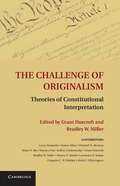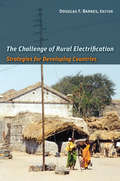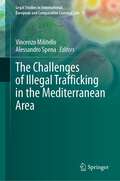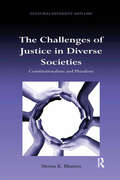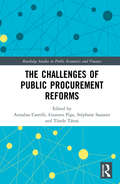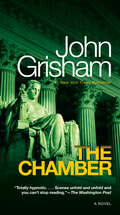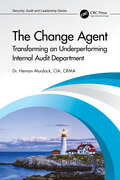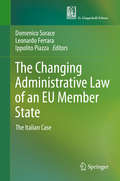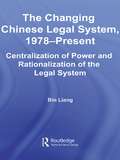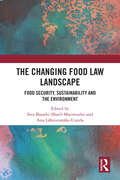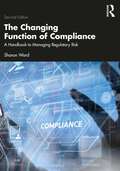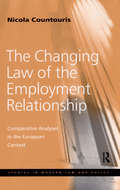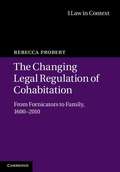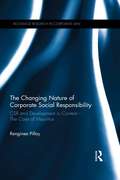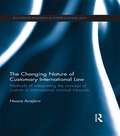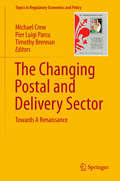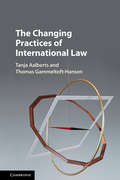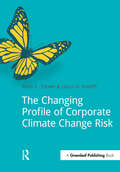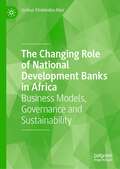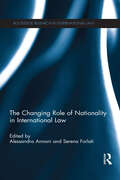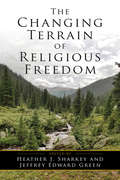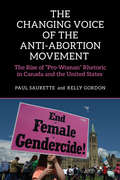- Table View
- List View
The Challenge of Originalism: Theories of Constitutional Interpretation
by Grant Huscroft Bradley MillerOriginalism is a force to be reckoned with in constitutional interpretation. At one time a monolithic theory of constitutional interpretation, contemporary originalism has developed into a sophisticated family of theories about how to interpret and reason with a constitution. Contemporary originalists harness the resources of linguistic, moral, and political philosophy to propose methodologies for the interpretation of constitutional texts and provide reasons for fidelity to those texts. The essays in this volume, which includes contributions from the flag bearers of several competing schools of constitutional interpretation, provides an introduction to the development of originalist thought, showcases the great range of contemporary originalist constitutional scholarship, and situates competing schools of thought in dialogue with each other. They also make new contributions to the methodological and normative disputes between originalists and non-originalists, and among originalists themselves.
The Challenge of Rural Electrification: Strategies for Developing Countries
by Douglas F. BarnesDouglas Barnes and his team of development experts provide an essential guide that can help improve the quality of life to the estimated 1.6 billion rural people in the world who are without electricity. The difficulties in bringing electricity to rural areas are formidable: Low population densities result in high capital and operating costs. Consumers are often poor, and their electricity consumption is low. Politicians interfere with the planning and operations of programs, insisting on favored constituents. Yet, as Barnes and his contributors demonstrate, many countries have overcome these obstacles. The Challenge of Rural Electrification provides lessons from successful programs in Bangladesh, Chile, China, Costa Rica, Mexico, the Philippines, Thailand, and Tunisia, as well as Ireland and the United States. These insights are presented in a format that should be accessible to a broad range of policymakers, development professionals, and community advocates. Barnes and his contributors do not provide a single formula for bringing electricity to rural areas. They do not recommend a specific set of institutional arrangements for the participation of public sector companies, cooperatives, and private firms. They argue instead that successful programs follow a flexible, but still well-defined set of principles: a financially viable plan that clearly accounts for any subsidies; a cooperative relationship between electricity providers and local communities; and an operational separation from day-to-day government and politics.
The Challenges of Artificial Intelligence for Law in Europe (Data Science, Machine Intelligence, and Law #6)
by Marton Varju Kitti MezeiAs artificial intelligence continues to transform our world, Europe stands at the forefront of ensuring this revolutionary technology serves humanity&’s best interests. This essential volume brings together experts on law, regulation, human rights, ethics, and policy to provide the first comprehensive analysis of Europe&’s pioneering approach to AI regulation. From the landmark AI Act to data protection and data governance frameworks, this meticulously curated collection offers unprecedented insights into (1) the delicate balance between the public and private benefits of AI, and the public and private risks it poses; (2) the regulatory policy and regulatory strategy influencing European law-making; (3) the role of ethics and human rights in regulating AI in Europe; (4) the real-world implications of evolving European AI regulation; and (5) future challenges and opportunities in the rapidly evolving AI landscape.Distinguished contributors from the fields of legal scholarship, policymaking, and legal practice provide unique perspectives on the legal and policy foundations of the AI Act, the Council of Europe Framework Convention, and other international documents; the regulatory design and requirements of the AI Act; the challenges of using AI in adjacent legal and regulatory areas; ethical issues surrounding the technology and their impact on its proliferation in the private and public sectors; and compliance-related challenges and practical solutions in key sectors.This authoritative work offers invaluable guidance to help legal professionals, researchers, policymakers, and technology executives navigate the complexities of AI regulation at the intersections of innovation, the public and private good, and social control. The volume combines theoretical depth and contextual analysis with practical applicability, making it an indispensable resource for anyone involved in shaping or adapting to Europe&’s AI regulatory landscape. The book is also essential reading for AI researchers and developers, technology consultants and industry analysts, policymakers and regulators, legal practitioners and compliance officers.
The Challenges of Illegal Trafficking in the Mediterranean Area (Legal Studies in International, European and Comparative Criminal Law #9)
by Vincenzo Militello Alessandro SpenaThe book deals with illicit trafficking in the Mediterranean, seen as a borderline issue between mobility and security under a strongly interdisciplinary approach. The opening part is dedicated to issues that transversally concern illegal trafficking: criminological, criminal law, criminal procedure, but also international law issues. This part presents a kind of general theory of illegal trafficking, showing its recurring aspects and identifying the legal and criminal-political issues that would be best addressed by a unified approach to the matter. The other parts are devoted to presenting, instead, a special part overview of illegal trafficking. The second and the third section are devoted, in particular, to illegal traffics having human beings as their objects. More specifically, the second part examines smuggling of migrants, which has a central - criminological and criminal-political - relevance among the illegal traffics taking place in the Mediterranean. The third part deals with the neighbouring theme of human trafficking, especially in its connection with the problem of labour exploitation. Finally, the fourth part focuses on some trafficking in goods, offering a selected and representative overview of some of the most significant forms that such trafficking can take: tobacco trafficking, drug trafficking and trafficking in cultural goods.
The Challenges of Justice in Diverse Societies: Constitutionalism and Pluralism (Cultural Diversity and Law)
by Meena K. BhamraIn the urgency to respond to the challenges posed by diversity in contemporary societies, the discussion of normative foundations is often overlooked. This book takes that important first step, and offers new ways of thinking about diversity. Its contribution to an ongoing dialogue in this field lies in the construction of a normative framework which endeavours to better understand the challenges of justice in diverse societies. By applying this normative framework to specific and broader examples of injustices in the spheres of religion, culture, race, ethnicity, gender and nationality, the book demonstrates how constitutional pluralist discourses can contribute both to new and legal responses to diversity. The book will be of interest to legal professionals, policy makers, law students and scholars concerned with exploring diversity in the 21st century.
The Challenges of Public Procurement Reforms (Routledge Studies in Public Economics and Finance)
by Annalisa CastelliPublic procurement affects a substantial share of world trade flows, amounting to 1000 billion euros per year. In the EU, the public purchase of works, goods and services has been estimated to account on average for 16 percent of GDP. The novelty of this book is that it focuses on the new European Union Directives approved in 2014 by the EU Parliament. The book consists of original contributions related to four specific themes of interest to the procurers’ day-to-day role in modern public purchasing organizations – both economists and lawyers – allowing for relevant exchanges of views and “real time” interaction. The four sections which characterize the book are Life-cycle Costing in Public Procurement; Calculating Costs and Savings of Public Procurement; Corruption and Probity in Public Procurement and Public Procurement and International Trade Agreements: CETA, TTIP and beyond. These themes have been chosen for their current relevance in relation to the new European Public Procurement Directives and beyond. The original format features, as is the case with the first three volumes, an introductory exchange between leading academics and practitioners, from differing disciplines. It offers a series of sequential interactions between economists, lawyers and technical experts who supplement one another, so as to enrich the liveliness of the debate and improve the mutual understanding between the various professions. This essential guide will be of interest to policymakers, academics, students and researchers, as well as practitioners working in the field of EU public procurement.
The Chamber
by John GrishamIn the corridors of Chicago's top law firm: Twenty-six-year-old Adam Hall stands on the brink of a brilliant legal career. Now he is risking it all for a death-row killer and an impossible case. Maximum Security Unit, Mississippi State Prison: Sam Cayhall is a former Klansman and unrepentant racist now facing the death penalty for a fatal bombing in 1967. He has run out of chances -- except for one: the young, liberal Chicago lawyer who just happens to be his grandson. While the executioners prepare the gas chamber, while the protesters gather and the TV cameras wait, Adam has only days, hours, minutes to save his client. For between the two men is a chasm of shame, family lies, and secrets -- including the one secret that could save Sam Cayhall's life...or cost Adam his.(P)1999 Random House, LLC
The Chamber: A Novel (Pearson English Graded Readers Ser. #Bk. 6)
by John Grisham#1 NEW YORK TIMES BESTSELLER • &“A dark and thoughtful tale pulsing with moral uncertainties . . . Grisham is at his best.&”—PeopleIn Chicago&’s top law firm, a young lawyer stands on the brink of a brilliant career. Now twenty-six-year-old Adam Hall is risking it all for a death-row killer and an impossible case: Sam Cayhall is a former Klansman and unrepentant racist facing the death penalty for a fatal bombing in 1967. Cayhall has run out of chances—except for one: a determined lawyer who just happens to be his grandson.While the executioners prepare the gas chamber, while the protesters gather, and while the TV cameras wait, Adam has only days, hours, minutes to save his client. For between the two men is a chasm of shame, family lies, and secrets—including the one secret that could save Sam Cayhall&’s life . . . or cost Adam his.
The Change Agent: Transforming an Underperforming Internal Audit Department (Security, Audit and Leadership Series)
by Hernan MurdockJohn Taylor has been hired to transform the underperforming internal audit unit at InSports. The auditors are not reviewing what the audit committee and executive leadership consider essential for the organization’s success, their methodology is subpar, and their relationships with their clients are strained. The audit committee has been patient, but not anymore. Their mandate is clear: make clear improvements in one year or the function will be outsourced. This is the story of a visionary leader who needs a strategy to transform processes and deliver better results for stakeholders at all levels within the organization. The audit committee, all levels of management, and employees expect more from internal audit. Now, John must lead the group through 12 challenging months as they focus on what matters most when performing audit and advisory services. They must communicate results faster and better, leverage existing quality control and data analytics techniques, and, with every encounter, help the organization address strategic, operational, compliance, and financial risks. With similarities to "The Goal" and "The Phoenix Project" and leveraging Kotter’s 8-Step Process for Leading Change, follow John and the internal audit team from Boston to New York, San Francisco, London, and Buenos Aires, as they address almost insurmountable challenges in their transformation journey.
The Changing Administrative Law of an EU Member State: The Italian Case
by Domenico Sorace Leonardo Ferrara Ippolito PiazzaThis book presents the evolution of Italian administrative law in the context of the EU, describing its distinctive features and comparing it with other experiences across Europe. It provides a comprehensive overview of administrative law in Italy, focusing on the main changes occurred over the last few decades.Although the respective chapters generally pursue a legal approach, they also consider the influence of economic, social, cultural and technological factors on the evolution of public administration and administrative law.The book is divided into three parts. The first part addresses general issues (e.g. procedures and organization of public administrations, administrative justice). The second part focuses on more specific topics (e.g. public intervention in the economy, healthcare management, local government). In the third part, the evolution of Italian administrative law is discussed in a comparative perspective.
The Changing Chinese Legal System, 1978-Present: Centralization of Power and Rationalization of the Legal System (East Asia: History, Politics, Sociology and Culture)
by Bin LiangThis groundbreaking book examines the changing Chinese legal system since 1978. In addition to historical analyses of changes at the economic, political-legal, and social levels, Liang gives special attention to crime and punishment functions of the legal system, and the current judicial system based on field research, i.e., court observations in both Beijing and Chengdu. The court system has been in a process of systemization, both internally and externally, seeking more power and relative independence. However, traditional influences, such as preference of mediation (over litigation) and substantive justice (over procedural justice), and lack of respect (from the masses) and guaranteed power (from the political structure), still have major impacts on the building and operation of the judicial system. Liang also shrewdly places the Chinese legal and political reform within the global system. This book, which reshapes our understanding of the economic, political, and essentially legal changes in China within the global context, will be crucial reading for scholars of Asia, law, criminal justice, and sociology.
The Changing Food Law Landscape: Food Security, Sustainability and the Environment
by Anu Lähteenmäki-Uutela Siva Barathi Sharl MarimuthuThis book analyses the current debates within food system governance, covering different aspects of food systems (from production to consumption) as well as different fields of law (from human rights law to environmental law). Recognizing that the law, in interacting with multiple disciplines, plays a major role in setting binding targets for sustainable innovation and business transformation, it brings together contributors from a wide range of professions, including agriculture, law, and business to examine the dimensions of food systems and the challenges in transforming them.The contributors to this book examine some of the most significant aspects of food law and regulation, including the effects of global warming, intellectual property rights, and human rights, as well as local and international viewpoints on food safety, information sharing, and systems transformation. They consider the history and present challenges of food production, the different approaches to addressing the issues faced, and the factors of human biology, psychology, cultural norms and religion that shape our food environments. The analysis of knowledge, values and institutions provides a holistic analysis of human food systems. Topics such as regenerative agriculture, novel and alternative foods, and health-enhancing foods are also covered.With its interdisciplinary approach, this book will interest researchers in agricultural law, food policy, environmental law, transdisciplinary food studies, and food science.
The Changing Function of Compliance: A Handbook to Managing Regulatory Risk
by Sharon WardAs risks arising within the business environment grow in size and complexity, so too do the regulatory requirements put in place to manage them. The pace of regulatory change is itself a significant business risk, and compliance departments are under increasing pressure to keep up with the change and adapt their organisations accordingly. This new edition of what has become an indispensable guide to regulation compliance brings readers up to date with changing areas of focus and provides guidance for regulated firms and regulators alike. The Changing Function of Compliance considers the relationship between regulation and compliance as well as key influences on both, offering insight into the effectiveness of current approaches and addressing practical compliance challenges. It explains the purpose and development of regulatory risk management and the existing regulatory environment, and provides a detailed exploration of the compliance function, explaining how the role might be strengthened and how best to approach the role to enable it to be effective. This practical and accessible handbook includes a mix of hands-on advice, examples and research based on the experiences of practitioners, educators and regulators drawn from across a wide range of jurisdictions and sectors. This book is an essential read, whether you are concerned about the growing and changing implications of regulatory risk, the benefit of leveraging additional value from your compliance function or your own compliance role or ways of transforming and sustaining the function to ensure its continued relevance to the business.
The Changing Law of the Employment Relationship: Comparative Analyses in the European Context (Studies in Modern Law and Policy)
by Nicola CountourisDuring the past few decades, industrialized countries have witnessed a progressive crisis of the regulatory framework sustaining the binary model of the employment relationship based on the subordinate employment/autonomous self-employment dichotomy. New atypical and hybrid working arrangements have emerged, challenging the traditional notions of, and divisions between, autonomy and subordination. This in turn has strained labour law systems across industrialized countries that were previously based on the notion of dependent and subordinate employment to cast their personal scope of application. Nicola Countouris advances ideas for a new dynamic equilibrium in employment law to accommodate this evolution, providing a comparative account of the development of the employment relationship in four key European countries - the UK, Germany, France and Italy.
The Changing Legal Regulation of Cohabitation
by Rebecca ProbertThis book has three key aims: first, to show how the legal treatment of cohabiting couples has changed over the past four centuries, from punishment as fornicators in the seventeenth century to eventual acceptance as family in the late twentieth; second, to chart how the language used to refer to cohabitation has changed over time and how different terms influenced policy debates and public perceptions; and, third, to estimate the extent of cohabitation in earlier centuries. To achieve this it draws on hundreds of reported and unreported cases as well as legislation, policy papers and debates in Parliament; thousands of newspaper reports and magazine articles; and innovative cohort studies that provide new and more reliable evidence as to the incidence (or rather the rarity) of cohabitation in eighteenth- and nineteenth-century England. It concludes with a consideration of the relationship between legal regulation and social trends.
The Changing Nature of Corporate Social Responsibility: CSR and Development – The Case of Mauritius (Routledge Research in Corporate Law)
by Renginee PillayCorporate Social Responsibility (CSR) has increasingly been promoted as an important mechanism for furthering economic and social development goals in developing countries. In such an optimistic climate, questions arise as to whether CSR can bear the weight of the increasing expectations being heaped on its shoulders. This book examines the changing nature of corporate social responsibility as it has been conceived over the past eighty years. It considers the historical and socio-legal developments of the idea of CSR and the various conceptions of the corporation which underlie different realisations of CSR. The book explores the model of CSR deployed in the developing world as well as the links between CSR and development. Renginee Pillay uses Mauritius as a case-study, demonstrating how CSR and corporate governance issues have come to the fore of political, financial and legal landscapes. Drawing on empirical research, the book examines how the first legislation of its kind has been implemented in Mauritius, and analyses its impact on development. In its work to evaluate the contribution CSR can make to development, this book will be of great use and interest to students and researchers of business and company law, business ethics, and development studies.
The Changing Nature of Customary International Law: Methods of Interpreting the Concept of Custom in International Criminal Tribunals (Routledge Research in International Law)
by Noora ArajärviThis book examines the evolution of customary international law (CIL) as a source of international law. Using the International Criminal Tribunal for the former Yugoslavia (ICTY) as a key case study, the book explores the importance of CIL in the development of international criminal law and focuses on the ways in which international criminal tribunals can be said to change the ways in which CIL is formed and identified. In doing so, the book surveys the process and substance of CIL, as well as the problematic distinction between the elements of state practice and opinio juris. <P><P> By applying an inclusive positivist approach, Noora Arajärvi analyses the methodologies of identification of CIL in selected cases of the ICTY, and their normative foundations. Through examination of the case-law and the reasoning of courts and tribunals, Arajärvi demonstrates to what extent the court's chosen method of identification of CIL affects the process of custom formation and the resulting system of norms in general. <P><P> The book will be of great value to researchers and scholars of international law, international relations, and practitioners with interests in customary international law.
The Changing Postal and Delivery Sector
by Timothy Brennan Michael Crew Pier Luigi ParcuThis book addresses some of the major issues facing postal and delivery services throughout the world. Postal operators worldwide have been slow to address the threats from and opportunities created by electronic competition. The European Commission and member states are wrestling with these issues, while at the same time continuing to deal with the interrelated issues of implementing entry into postal markets and maintaining the universal service obligation. The Postal Accountability and Enhancement Act of 2006 in the U. S. exacerbated financial and managerial problems faced by USPS that result in part from electronic substitution for letter delivery. Comprised of original essays by prominent researchers in the field, this book addresses the new reality of the postal industry and proposes ways in which postal operators might reinvent themselves. Issues discussed include cross-border parcel delivery, e-commerce, the transformation of postal networks, and the effects of postal liberalization. This book will be of interest to postal operators, regulatory commissions, consulting firms, competitors and customers, experts in the postal economics, law, and business, and those charged with the responsibility for designing and implementing postal sector policies. Researchers in regulatory economics, transportation technology, and industrial organization will also find useful information in this volume.
The Changing Practices of International Law
by Tanja Aalberts Thomas Gammeltoft-HansenWith more than 158 000 treaties and some 125 judicial organizations, international law has become an inescapable factor in world politics since the Second World War. In recent years, however, international law has also been increasingly challenged as states are voicing concerns that it is producing unintended effects and accuse international courts of judicial activism. This book provides an important corrective to existing theories of international law by focusing on how states respond to increased legalization and rely on legal expertise to manoeuvre within and against international law. Through a number of case studies, covering a wide range of topical issues, such as surveillance, environmental regulation, migration and foreign investments, the book argues that the expansion and increased institutionalization of international law itself have created the structural premise for this type of politics of international law. More international law paradoxically increases states’ political room of manoeuvre in international society.
The Changing Profile of Corporate Climate Change Risk (Doshorts Ser.)
by Mark Trexler Laura KosloffThis book will help business executives to (1) rethink their perceptions of climate risk (2) evaluate whether their company is effectively positioned, and (3) make informed and prudent business decisions about climate change risk in an environment rife with policy uncertainty.Business risk associated with climate change is commonly assumed to be primarily policy driven. Many companies internalize the current stalemate over global climate policy into a perception that climate risk is no longer a critical issue. Business climate risks, however, include: Operational and Supply Chain (Physical) Risk, Brand Risk, Market-driven Structural Risk, Liability Risk.As national and global policy to materially reduce climate change is delayed, it is business-prudent to assume that the level of climate risk is increasing. Even if policy risk might seem lower today than a few years ago, political will can change quickly. Should physical impacts of climate change manifest in dramatic ways, for example, draconian climate policy is likely to follow quickly. These conditions create a complex and shifting business risk environment, and most companies either overlook or substantially underestimate key climate risks. How many companies, for example, are positioned for material climate change outcomes, whether physical or regulatory? Companies with little climate change exposure may not face much downside risk from taking a wait-and-see approach. For those with greater exposure, being "too late" to respond will mean costs and competitive impacts that could have been avoided. Being "too early," however, can mean being penalized later for actions that reduce a company’s emissions today, or competitive disadvantage from getting too far out in front of competitors.
The Changing Role of Criminal Law in Controlling Corporate Behavior
by James M. Anderson Ivan WaggonerThis report addresses the use of criminal sanctions to control corporate behavior prosecutions both of corporations and of employees for actions taken on corporations behalf. The authors describe the current state of the use of criminal sanctions in controlling corporate behavior, describe how the current regime developed, and offer suggestions about how the use of criminal sanctions to control corporate behavior might be improved. "
The Changing Role of National Development Banks in Africa: Business Models, Governance and Sustainability
by Joshua Yindenaba AborThis book examines the changing role of national development banks (NDBs) in Africa. It presents a comprehensive overview of NDBs in Africa, examining their key characteristics, theoretical underpinnings, and growing importance to African economies.The book fully examines the role of NDBs and their potential to support development goals, address gaps in finance left by underdeveloped capital markets, and mobilize resources from the public and private sectors to encourage new long-term investments. Chapters cover the historical background and theoretical rationale for NDBs; the contemporary role of NDBs including their role in sustainable development, climate finance initiatives, and infrastructure development; funding sources, business models, monitoring and impact evaluation; and corporate governance, risk management and regulation. Case studies are also included to demonstrate the individual contributions of NDBs to several national economies.The book contributes to the limited literature in this area by providing a detailed resource on NDBs for scholars, students, policymakers and regulators working in the areas of development finance and banking.
The Changing Role of Nationality in International Law (Routledge Research in International Law)
by Serena Forlati Alessandra AnnoniThe book explores the current role of nationality from the point of view of international law, reassessing the validity of the ‘classical’, state-centered, approach to nationality in light of the ‘new’ role the human being is gradually acquiring within the international legal order. In this framework, the collection assesses the impact of international human rights rules on the international discourse on nationality and explores the significance international (including private international) law attaches to the links individuals may establish with states other than that of nationality. The book weighs the significance of the bond of nationality in the context of regional integration systems, and explores the fields of international law in which nationality still plays a pivotal role, such as diplomatic protection and dispute settlement in international investment law. The collection includes contributions from legal scholars of different nationalities and academic backgrounds, and offers an excellent resource for academics, practitioners and students undertaking advanced studies in international law.
The Changing Terrain of Religious Freedom (Democracy, Citizenship, and Constitutionalism)
by Heather J. Sharkey and Jeffrey Edward GreenThe Changing Terrain of Religious Freedom offers theoretical, historical, and legal perspectives on religious freedom, while examining its meaning as an experience, value, and right. The volume starts from the premise that the terrain of religious freedom has never been easy and smooth. Across societies and throughout history, defending or contesting principles of religious freedom has required compromise among multiple interests, balancing values, and wrangling with the law.Drawing on examples from the United States and around the world, and approaching the subject from the disciplines of history, law, sociology, philosophy, religious studies, and political science, the essays in this volume illustrate these challenges. They sketch the contours of contemporary debates while showing how the landscape of religious freedom has shifted over time. They consider various stakeholders that have asserted competing claims, among them individuals and groups; members of minority and majority communities; states and corporations (including both religious organizations and businesses); and believers and non-believers. Taken together, the studies in this volume suggest that understanding religious freedom means grappling with conflicting and perhaps irreconcilable claims about whose rights should prevail over others, what religion is or may be, and how religion should relate to other cultural values.
The Changing Voice of the Anti-Abortion Movement: The Rise of "Pro-Woman" Rhetoric in Canada and the United States
by Kelly Gordon Paul SauretteWhen journalists, academics, and politicians describe the North American anti-abortion movement, they often describe a campaign that is male-dominated, aggressive, and even violent in its tactics, religious in motivation, anti-women in tone, and fetal-centric in arguments and rhetoric. Are they correct?In The Changing Voice of the Anti-Abortion Movement, Paul Saurette and Kelly Gordon suggest that the reality is far more complicated, particularly in Canada. Today, anti-abortion activism increasingly presents itself as "pro-women": using female spokespersons, adopting medical and scientific language to claim that abortion harms women, and employing a wide range of more subtle framing and narrative rhetorical tactics that use traditionally progressive themes to present the anti-abortion position as more feminist than pro-choice feminism.Following a succinct but comprehensive overview of the two-hundred year history of North American debate and legislation on abortion, Saurette and Gordon present the results of their systematic, five-year quantitative and qualitative discourse analysis, supplemented by extensive first-person observations, and outline the implications that flow from these findings. Their discoveries are a challenge to our current assumptions about the abortion debate today, and their conclusions will be compelling for both scholars and activists alike.
